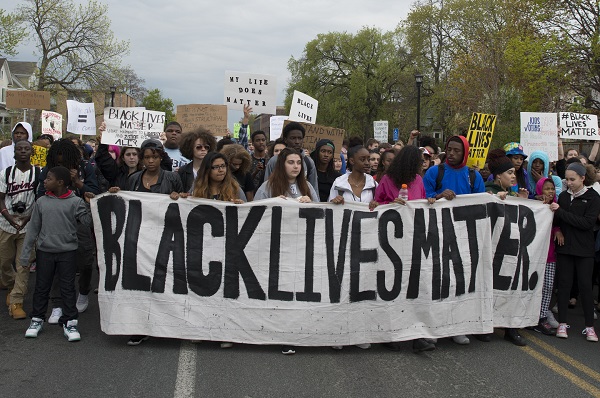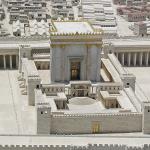
I stayed out of the fray of commenting on Black Lives Matter until yesterday, because we’ve been moving, not out of indifference.
Yesterday, I had the pleasure instead of giving the acting editor of Patheos Catholic comment on this important issue.
As a naturalized citizen I have never really understood three things about America: its barbarous abortion culture, its mad gun culture, and its horrible treatment of African Americans.
Polish society has its shortcomings too, but we’re not discussing them right now.
Most of what passes for discussion of Black Lives Matter among white Catholics is shallow in its theology.
This is why I was escpecially impressed when theologian A.J. Boyd–teaches theology at Assumption College and ecumenism and interreligious dialogue at the Pontifical Beda College–put Black Lives Matter (and other similar movements of the oppressed) within the context of what the Catechism calls the preferential option for the poor:
I have to confess I do not see why this is so difficult to fathom. All life matters: Black life matters; Blue life matters. You cannot pit one against the others. Anger clouds judgement, and there is reason to be angry, and afraid. There is also reason for hope, and for reason.
At times we need to focus on particular issues of violence or the lack of respect for human dignity and fight against abortion, death penalty, war, terrorism, torture, euthanasia, poverty, homelessness…, and all other threats to life, both individual and systemic.
So at times we need to focus on the suffering of “Black Lives,” and of “Blue Lives” who have been targeted unjustly, but it is all in the context of the fact that All Life Matters. If you really mean “All Lives Matter” then you take time to respect each one individually in its place, and give priority to those suffering most.
(The parallel to me is the clergy sex abuse and cover-up scandal in the Catholic Church. It is true that sexual abuse happens in schools, in families, in other religions so it is stupid to make as if it is a uniquely Catholic problem; however, when a bishop of spokesperson of the Church’s first response to accusations of abuse in the Church is “but it happens elsewhere too!” this is also disingenuous and fails to engage the systemic problems that need fixing, to say nothing of accountability and restitution).
If you use “All Lives Matter” to dismiss the genuine concerns of “Black Lives Matter” or “Blue Lives Matter” you are a racist or an inciter of anti-police violence, respectively.
If you accuse *everyone* who says “all lives matter” of being racist or anti-cop, regardless of their intent, then you have become what you hate: a racist and/or a promoter of violence.
If you’re not familiar with the special focus of the Catholic preferential option for the poor, then here is what the Catechism says about it (I also want you to know that this isn’t some lefty-Catholic invention):
In its various forms – material deprivation, unjust oppression, physical and psychological illness and death – human misery is the obvious sign of the inherited condition of frailty and need for salvation in which man finds himself as a consequence of original sin. This misery elicited the compassion of Christ the Savior, who willingly took it upon himself and identified himself with the least of his brethren. Hence, those who are oppressed by poverty are the object of a preferential love on the part of the Church which, since her origin and in spite of the failings of many of her members, has not ceased to work for their relief, defense, and liberation through numerous works of charity which remain indispensable always and everywhere.
It is encouraging to see the much beleaguered Twin Archdiocese recognize this basic tenet of Catholic theology. As America Magazine reports, Philando Castile’s funeral will take place in its cathedral today:
Philando Castile, killed by a police officer in suburban St. Paul, Minn., on July 6, will be remembered at a funeral service inside Catholic Cathedral of St. Paul this week, the archdiocese announced on July 12.
Castile’s family belongs to a nearby Baptist church, but Castile’s mother, Valerie, requested that the service be held at the cathedral as a way for “people to come together in a new way,” according to the archdiocese’s statement. She explained during a press conference on July 12 that she chose the cathedral for her son’s funeral because “my son is a king, and he is also a martyr, so I thought that was the best place for his services.”
The Rev. Steve Daniels, pastor of Shiloh Missionary Baptist Church, will deliver a eulogy and the rector of the cathedral, Father John Ubel, will lead the prayers during Castile’s funeral. The texts at the service will “focus on the preservation of peace, justice and reconciliation among all people” and incorporate Catholic prayers used for funerals held outside of a Mass.
The archdiocese noted that “burying the dead is a Corporal Work of Mercy, and of particular importance in this Jubilee Year of Mercy, as declared by Pope Francis.” It called the cathedral, which seats about 3,000, “a spiritual home for all.”
Archbishop Bernard Hebda held a special Mass for peace at the cathedral on July 10, drawing about 250 people, some of whom wore white t-shirts imprinted with “Philando Castile” in black letters. The Mass, Hebda said, was held to “allow us to ask the Lord not only to console Mr. Castile’s grieving family and loved ones, but also to heal the divisions in our community, to guide our public servants in their pursuit of the common good and to satisfy the longings of those who thirst for justice and peace.”
It is also encouraging to see Castile’s mother recognize the true catholicity of the Church, even when many Catholics don’t. The Church has a preferential option for martyrs (those so poor they are robbed of life) and that is also a powerful argument for the Church.
See William T. Cavanaugh’s Torture and Eucharist: Theology, Politics, and the Body of Christ for an almost traumatic book-length account of this “argument.”
To explore the latest on the intersection between the soul, poverty, and politics see Why Do “All Lives Matter” Armchair Commentators Disgust Me More after the Murder of Philando Castile?
Please consider making a donation to this blog through the donation button on the upper right side of its homepage. We’re moving to a new place and things will be tight financially for the first few months. I also recently blew out a car tire just when we can least afford to deal with it.
Stay in touch! Like Cosmos the in Lost on Facebook:
















